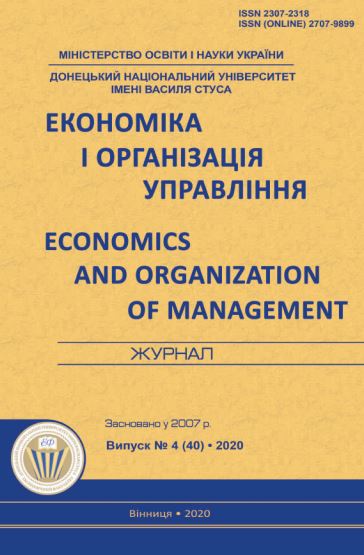Managerial capabilities as anthecedents of enterprise capital: transformation and financing
DOI:
https://doi.org/10.31558/2307-2318.2020.4.26Keywords:
management potential; dynamic management capital; human capital; social capital; mechanism for using management capital; flexible managementAbstract
In the article, based on the use of management theory, finance and risk theory, managerial capabilities is considered as a set of managers' abilities in updating and transforming the firm's resource base. This will help maintain and develop competitive advantage and productivity. The antecedents of dynamic managerial capabilities are managerial human and social potentials and managerial knowledge. They are formed as a result of managers' abilities to recognize opportunities and threats, seize opportunities, and transform the resource base. The subjects of managerial capabilities are managers of all management levels. In the context of strategic changes and flexible management, managerial capabilities is transformed into managerial capital, which is part of human capital. It has been proven that management capital has the same ability to generate cash flows by increasing capital as financial capital and exists in two forms: as an asset and a factor of production; as a source of capital growth. The possibility of attributing managerial capabilities capital to the categorical apparatus of financial theory is considered. It is proved that the content and significance of managerial capabilities capital only allows it to be used through the mechanism of circulation of investments and investment risks as a decrease in unwanted risk in exchange for the loss of target income.
References
Barnard, C. (1938). The Functions of the Executive. Cambridge, MA: Harvard University Press.
Penrose, E. T. (1959). The theory of growth of the firm. New York, NY: Wiley.
Mintzberg, H. (1978). Patterns in strategy formation, Management Science, 24(9), 934–948.
Pettigrew, A. M. (1973).The Politics of Organisational Decision-Making, London, U.K.: Tavistock.
Teece, D. J., Pisano, G., & Shuen, A. (1990). Firm capabilities, resources and the concept of strategy (Economic Analysis and Policy Working Paper EAP 38, University of California).
Teece, D. J. (2016). Dynamic capabilities and entrepreneurial management in large organizations: Toward a theory of the (entrepreneurial) firm. European Economic Review, 86, 202–216.
Martin, J. A. (2011). Dynamic managerial capabilities and the multibusiness team: The role of episodic teams in executive leadership groups. Organization Science, 22(1), 118–140.
Adner, R., & Helfat, C. E. (2003). Corporate effects and dynamic managerial capabilities. Strategic Management Journal, 24(10), 1011–1025.
Zahra, S. A., Sapienza, H. J., & Davidsson, P. (2006). Entrepreneurship and dynamic capabilities: A review, model and research agenda. Journal of Management Studies, 43(4), 917–955.
Eisenhardt, K. M., & Martin, J. A. (2000). Dynamic capabilities: what are they? Strategic Management Journal, 21(10–11), 1105–1121.
Helfat, C. E., & Martin, J. A. (2015). Dynamic managerial capabilities: Review and assessment of managerial impact on strategic change, Journal of Management, 41(5), 1281–1312.
Kor, Y. Y., & Mesko, A. (2013). Dynamic managerial capabilities: Configuration and orchestration of top executives’ capabilities and the firm’s dominant logic. Strategic Management Journal, 34, 233–244.
Korzh N.V. (2017). Optimization of the structure of corporate capital throughout the lifecycle of a company. Науковий вісник НГУ, 2017, № 2. с.157-165.
Корж Н. В., Білан Ю.В. (2015). Передумови формування соціального капіталу. Актуальні проблеми економіки. Науковий журнал. 2015. № 7(169). С.263–270. – Режим доступу до журн.: http://eco-science.net/m/archive2015/366--7169.html
Николаева Ю. Р. (2015). Управление интеллектуальным капиталом в условиях инновационной экономики. Социально-экономические явления и процессы. 2015. № 10. С. 93–97.
Ковалев М. М. Современная финансовая теория и финансовое образование. Минск, 2003. 359 с.

